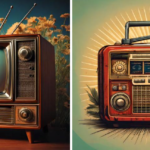Annually, multi-million dollar enterprises encounter diverse crises due to various circumstances, these companies often turn towards certain advertising schemes to compensate for losses incurred. Crisis management is crucial, an interesting way out of this predicament is nostalgia marketing. After the economical crises faced by the markets in 2020, lots of brands started capitalising on nostalgia and memories to touch consumer sentiment.
Let’s begin by looking at the first case study, which is the return of KFC’s icon, Colonel Sanders. In 2015, KFC was experiencing a fast decline in sales, especially in China, which was one of its largest markets. This significant drop was mostly due to a food safety scandal in 2014 which severely impacted consumer trust and sales.
So, KFC opted for the nostalgia route. They brought back their iconic figure, Colonel Sanders. Incorporating Colonel Sanders into popular culture, aimed to evoke a sense of nostalgia and remind customers of the brand’s long-standing heritage and original recipes, which helped reconnect with older customers while also appealing to a new generation. People were drawn towards their humorous commercials, this coupled with a sense of familiarity and comfort, worked wonders for KFC.,

Another interesting case that we will examine is the relaunch of Nintendo’s NES Classic edition in 2016. Nintendo’s flagship console, the Wii, was declining in popularity, and the company needed to boost sales and revenue. The company had just barely returned to profitability in 2015 after years of fiscal hardships, according to the company’s financial disclosures.
The rerelease of the beloved Nintendo Entertainment System (NES) console as well as the Super NES console, almost looked as if Nintendo was cashing in on customers’ nostalgia for a short-term sales boost.These products were wildly popular when they were first released, the re-released products quickly sold out and dominated the resale market.
The COVID-19 pandemic caused widespread job losses and economic uncertainty, consumers cut back on spending, especially on non-essential goods and services. As a result, the trend of advertisements that are centred around themes of nostalgia was brought back as a response to the fiscal crisis that the pandemic had brought upon the market. This strategy was well received by consumers from around the world.
Consumer sentiment is a powerful tool. The American Psychological Association links nostalgia with prosocial emotions like compassion, empathy, and altruism, which can influence consumers to make value-driven purchases. As consumers were in significant distress during the lockdown, brands decided to provide them with comfort and familiarity, as well as indulge in its profits, it’s like hitting two birds with one stone. The nostalgia focus on the “before years” – before the COVID-19 pandemic – stems from a retrospective perception of this period as a better time for many.
Overall, in the era of emotional consumption, the marketing environment has entered the emotional marketing stage and has become a powerful and effective branding gimmick used by companies all over the world.
27 Oct 2024
Keya Waghmare


